Catalytic Converter Replacement 3.1L
Removal Procedure
- Raise and support the vehicle. Refer to Lifting and Jacking the Vehicle in General Information.
- Disconnect the heated oxygen sensor (HO2S) electrical connector.
- Remove the exhaust manifold pipe stud nuts.
- Remove the exhaust manifold pipe gasket.
- Support the exhaust system.
- Remove the catalytic converter nuts.
- Remove the catalytic converter hangers.
- Remove the 3-way catalytic converter.
- Remove the catalytic converter gasket.
- Clean and inspect the exhaust manifold and the exhaust pipe gasket mating surfaces.
- Remove the heated oxygen sensor (HO2S) . Refer to Heated Oxygen Sensor 2 Replacement in Engine Controls - 3.1L.
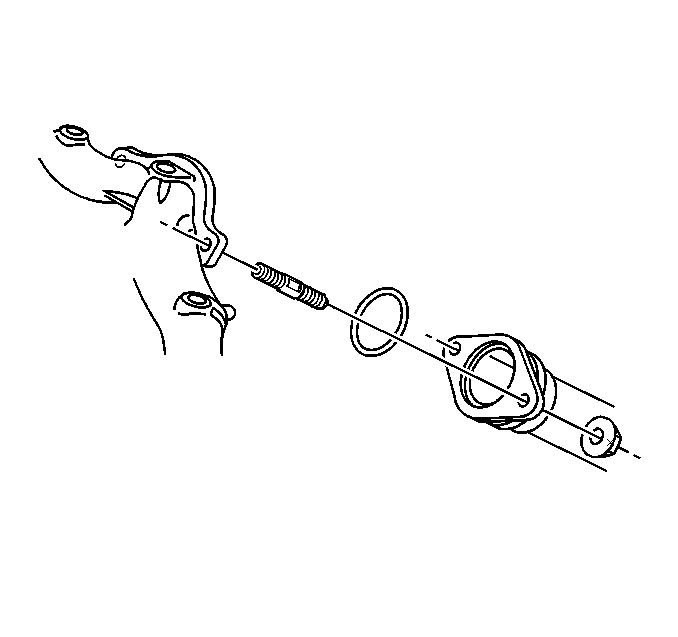
Important: The three way catalytic converter is serviced by replacing the entire assembly. Always replace the gaskets at the front and rear flanges when servicing the three way catalytic converter. Never install the original gasket.
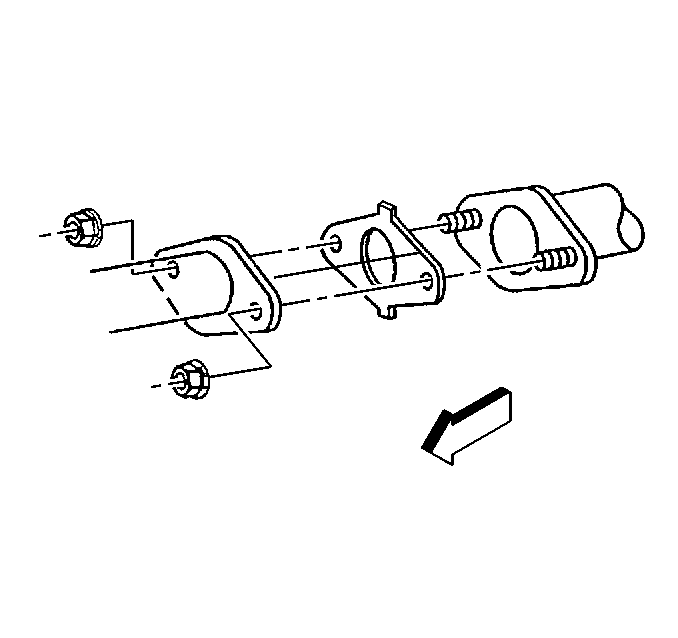
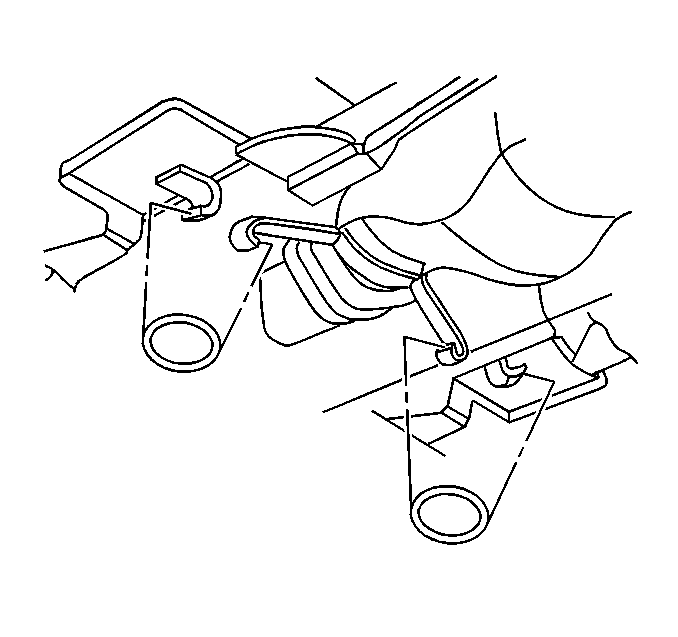
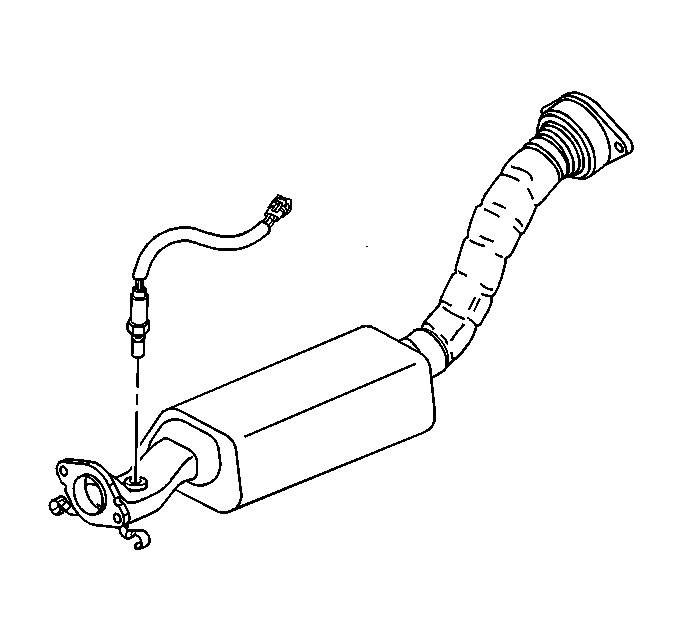
Installation Procedure
- Install the heated oxygen sensor (HO2S) . Refer to Heated Oxygen Sensor 2 Replacement in Engine Controls - 3.1L.
- Install a new gasket to the exhaust pipe studs.
- Install and support the 3-way catalytic converter.
- Install the catalytic converter nuts.
- Install a new exhaust manifold pipe gasket.
- Install the exhaust manifold pipe stud nuts.
- Install the catalytic converter hangers.
- Remove the support from the exhaust system.
- Connect the heated oxygen sensor (HO2S) electrical connector.
- Inspect the exhaust system for leaks and underbody contact.
- Lower the vehicle.


Notice: To prevent internal damage to the flexible coupling of the catalytic converter assembly, the converter must be supported. The vertical movement at the rear of the catalytic converter assembly must not exceed 6 degrees up or down.
Notice: Use the correct fastener in the correct location. Replacement fasteners must be the correct part number for that application. Fasteners requiring replacement or fasteners requiring the use of thread locking compound or sealant are identified in the service procedure. Do not use paints, lubricants, or corrosion inhibitors on fasteners or fastener joint surfaces unless specified. These coatings affect fastener torque and joint clamping force and may damage the fastener. Use the correct tightening sequence and specifications when installing fasteners in order to avoid damage to parts and systems.
Tighten
Tighten the nuts to 60 N·m (44 lb ft).

Tighten
Tighten the nuts to 35 N·m (26 lb ft).

Catalytic Converter Replacement 3.8L
Removal Procedure
- Raise and support the vehicle. Refer to Lifting and Jacking the Vehicle in General Information.
- Disconnect the heated oxygen sensor (HO2S) electrical connector.
- Remove the exhaust manifold pipe stud nuts.
- Remove the exhaust manifold pipe gasket.
- Support the exhaust system.
- Remove the catalytic converter nuts.
- Remove the catalytic converter hangers.
- Remove the 3-way catalytic converter.
- Remove the catalytic converter gasket.
- Clean and inspect the exhaust manifold and the exhaust pipe gasket mating surfaces.
- Remove the heated oxygen sensor (HO2S). Refer to Heated Oxygen Sensor 2 Replacement in Engine Controls - 3.8L.
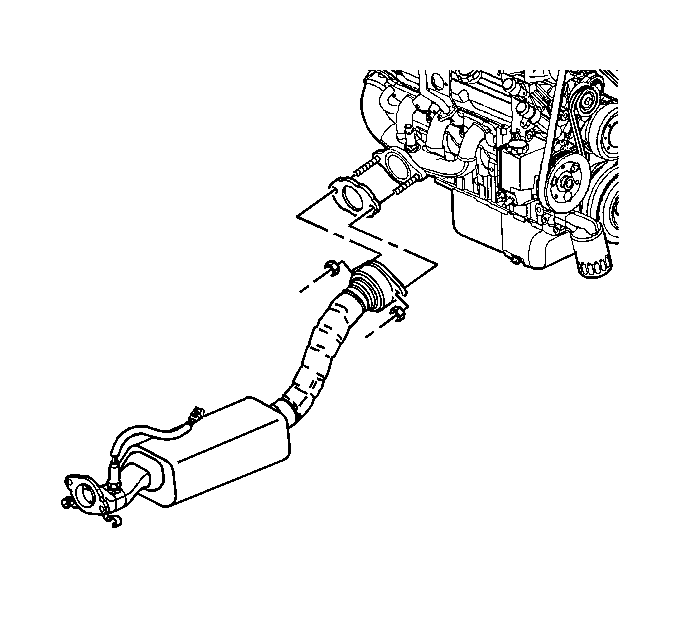
Important: The three way catalytic converter is serviced by replacing the entire assembly. Always replace the gaskets at the front and rear flanges when servicing the three way catalytic converter. Never install the original gasket.


Installation Procedure
- Install the heated oxygen sensor (HO2S). Refer to Heated Oxygen Sensor 2 Replacement in Engine Controls - 3.8L.
- Install a new gasket to the exhaust pipe studs.
- Install and support the 3-way catalytic converter.
- Install the catalytic converter nuts.
- Install a new exhaust manifold pipe gasket.
- Install the exhaust manifold pipe stud nuts.
- Install the catalytic converter hangers.
- Remove the support from the exhaust system.
- Connect the heated oxygen sensor (HO2S) electrical connector.
- Inspect the exhaust system for leaks and underbody contact.
- Lower the vehicle.

Notice: To prevent internal damage to the flexible coupling of the catalytic converter assembly, the converter must be supported. The vertical movement at the rear of the catalytic converter assembly must not exceed 6 degrees up or down.
Notice: Use the correct fastener in the correct location. Replacement fasteners must be the correct part number for that application. Fasteners requiring replacement or fasteners requiring the use of thread locking compound or sealant are identified in the service procedure. Do not use paints, lubricants, or corrosion inhibitors on fasteners or fastener joint surfaces unless specified. These coatings affect fastener torque and joint clamping force and may damage the fastener. Use the correct tightening sequence and specifications when installing fasteners in order to avoid damage to parts and systems.
Tighten
Tighten the nuts to 60 N·m (44 lb ft).

Tighten
Tighten the nuts to 35 N·m (26 lb ft).

